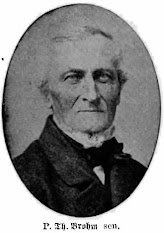- - - - - - - - - - - - - - - - - - - - - - - - - -
(Submitted.)
Luther's Letters.
Seldom will a man have written so many letters as Dr. Luther. The number of letters found so far and saved from destruction amounts to 2686, of which 2324 have actually appeared in print. Already in the year 1516 Luther complained to his friend, Joh. Lange, that the greatest part of his time was taken up by the business of letter-writing. How much this work must have increased since his name was mentioned far and wide in and outside Germany. Certainly those 2686 letters are only a small minority of all letters written by him.
When one takes into account the work which his actual teaching ministry laid out for him, the preaching, the writing of books, the many journeys which he had to undertake in the service of the Gospel, the numerous visits which he received, one can get an idea of the immense powers with which the man was equipped.
What gives his letters a peculiar interest is that they are addressed to so many different persons. There are letters to the emperor, the pope, cardinals and prelates, letters to kings, princes, dukes, counts and knights, letters to scholars, pastors, lawyers, physicians, artists and craftsmen, letters to communities of whole cities and countries, letters to those who were chased away or imprisoned for the sake of the Gospel, letters to all kinds of the afflicted, the grieved and the miserable, letters to his trusted friends, to his father, mother, brother, his wife and even to his four-year-old son, Hänschen.
As diverse as the persons to whom he wrote are, so diverse is the content of his letters. Some contain concerns and advice about the most important and difficult political issues of his time, others advice in matters of the Gospel and the church, others instruction and consolation in severe distress of conscience, others solve difficult theological questions and doubts, still others are friendly, amicable, even joking content, but always seasoned with God's Word.
All of Luther's letters bear the unmistakable mark of his loyal heart and the Christian modesty of the man on their foreheads; in addition, they are evidence of his loving, sympathetic heart, as well as of his great theological wisdom and prudence, with which he often skilfully unravels the most tangled knots and knows how to hit the nail on the head with his reply. It has been said that Luther's talents can be discerned from his books and his character from his letters. Certainly a very true remark.
Luther's letters indeed provide the Christian reader with the most delightful entertainment, if one has not otherwise allowed one's taste to be spoiled by the wretched reading of newspapers or novels. Here one is transported in spirit to that great time of the Reformation, so rich in gifts and powers, and becomes acquainted with it, as if from one's own experience; one becomes, as it were, a familiar associate of Luther and his most intimate friends. This reading is at the same time a highly instructive activity. From Luther's letters, one could easily compose a theological casuistry or a pastoral theology, as old Conrad Porta actually did to some extent. If one compares the letters and concerns of other learned men, which are often so turgid, prolix and dark, with the light and lively, concise, short and simple letters of Luther, there can be no doubt as to whom the preference is to be given. A lively, fresh spirit wafts through all of them and is suitable to awaken liveliness and freshness in the hearts of the readers.
As the honored readers have seen from No. 17 of the current volume of Der Luthearner [not found], it is the intention to publish a selection from the German letters of Dr. Luther for the current year of the Luther-Association [Luther-Vereins].
When I set about making the selection, I soon found that this was not a very easy thing to do. Often I had to put aside this and that beautiful letter to make room for an even more beautiful one. I am far from thinking that I have always made the right choice. I can only say that I have taken care to select letters which I could assume would be interesting, instructive and comforting to all, especially to unlearned readers who do not have access to Luther's complete works. If it should turn out later that some important letters have been passed over, then it would not be too late to provide a gleanings in a future year.
I have not arranged the letters according to their content, but according to the years, following the Erlangen edition of Luther's works. The 7th volume should contain letters from the year 1530, the 8th volume letters from and after 1530. Since the Erlangen edition has so far provided only the German letters, but the Latin letters are no less important, and often even richer and more instructive, so shall, if the Lord has mercy, later also a selection of the Latin letters be given in German translation.
- - - - - - - - - - - - - - - - - - - - - -

No comments:
Post a Comment
Comments only accepted when directly related to the post.